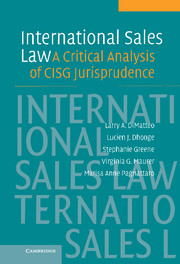Book contents
- Frontmatter
- Contents
- Preface
- Acknowledgments
- 1 INTRODUCTION
- 2 CISG METHODOLOGY AND JURISPRUDENCE
- 3 FORMATION: WRITING REQUIREMENTS
- 4 FORMATION: OFFER AND ACCEPTANCE RULES
- 5 OBLIGATIONS OF BUYERS
- 6 OBLIGATIONS OF SELLERS
- 7 COMMON OBLIGATIONS OF BUYERS AND SELLERS
- 8 BREACH OF CONTRACT BY SELLER
- 9 BREACH OF CONTRACT BY BUYER
- 10 DAMAGES, EXCUSE, AND PRESERVATION
- 11 SUMMARY AND OBSERVATIONS
- TABLE OF AUTHORITIES AND CASES
- APPENDIX A: UNITED NATIONS CONVENTION ON CONTRACTS FOR THE INTERNATIONAL SALE OF GOODS (CISG) (APRIL 11, 1980)
- APPENDIX B: CISG: TABLE OF CONTRACTING STATES (AS OF FEBRUARY 8, 2005)
- Index
3 - FORMATION: WRITING REQUIREMENTS
Published online by Cambridge University Press: 06 August 2009
- Frontmatter
- Contents
- Preface
- Acknowledgments
- 1 INTRODUCTION
- 2 CISG METHODOLOGY AND JURISPRUDENCE
- 3 FORMATION: WRITING REQUIREMENTS
- 4 FORMATION: OFFER AND ACCEPTANCE RULES
- 5 OBLIGATIONS OF BUYERS
- 6 OBLIGATIONS OF SELLERS
- 7 COMMON OBLIGATIONS OF BUYERS AND SELLERS
- 8 BREACH OF CONTRACT BY SELLER
- 9 BREACH OF CONTRACT BY BUYER
- 10 DAMAGES, EXCUSE, AND PRESERVATION
- 11 SUMMARY AND OBSERVATIONS
- TABLE OF AUTHORITIES AND CASES
- APPENDIX A: UNITED NATIONS CONVENTION ON CONTRACTS FOR THE INTERNATIONAL SALE OF GOODS (CISG) (APRIL 11, 1980)
- APPENDIX B: CISG: TABLE OF CONTRACTING STATES (AS OF FEBRUARY 8, 2005)
- Index
Summary
The CISG embodies a modern approach to contract formation, recognizing that contracts are often concluded quickly and without a formal writing. The CISG provisions dealing with contract formation are found in Part II of the convention, which contains the rules of formality and offer-acceptance. The rules of formality refer to the writing requirements, definiteness of terms, and types of admissible evidence. Offer-acceptance rules include issues dealing with the mechanics of formation, the battle of the forms scenario, and the firm offer rule. Article 29, found in Part III of the CISG, is concurrently analyzed for contract modification requirements. Before discussing the specific contract formation rules of the CISG, the first section of this chapter will briefly focus on the issue of precontractual liability. The CISG does not expressly cover the issue of precontractual liability. Nonetheless, the possibility for such liability is an important issue and will be examined first.
PRECONTRACTUAL LIABILITY
The subject of precontractual liability can be divided into two areas: first, the liability for the bad faith breaking off of negotiations; second, the enforceability of representations or informal writings given during the precontract or negotiation stage. According to American and English common law, a negotiating party owes no duty of good faith to the other party. One may terminate negotiations in bad faith without liability for the other parties' expenses. One major exception to this freedom of negotiation without liability is promissory estoppel or reliance theory.
- Type
- Chapter
- Information
- International Sales LawA Critical Analysis of CISG Jurisprudence, pp. 32 - 50Publisher: Cambridge University PressPrint publication year: 2005



